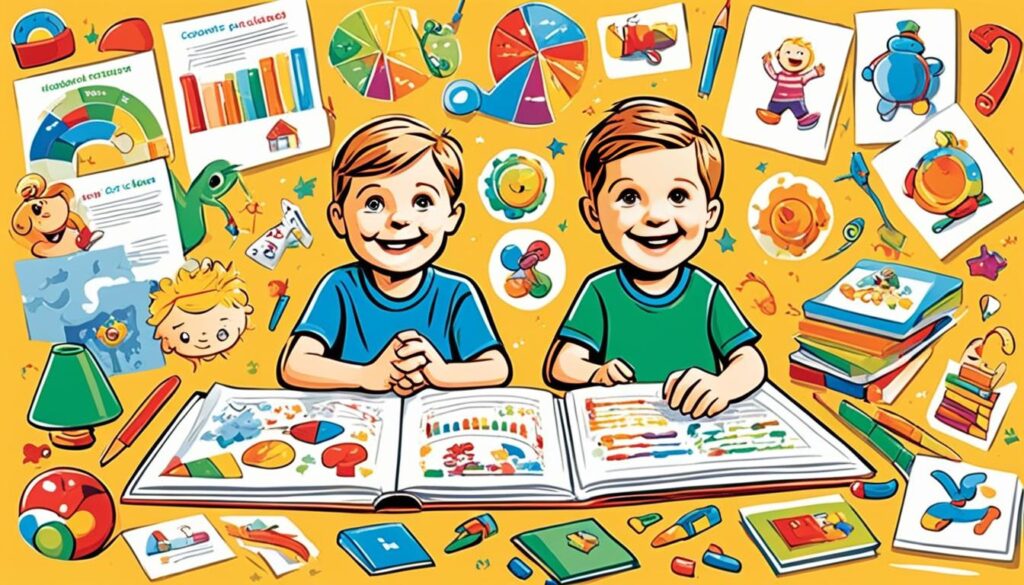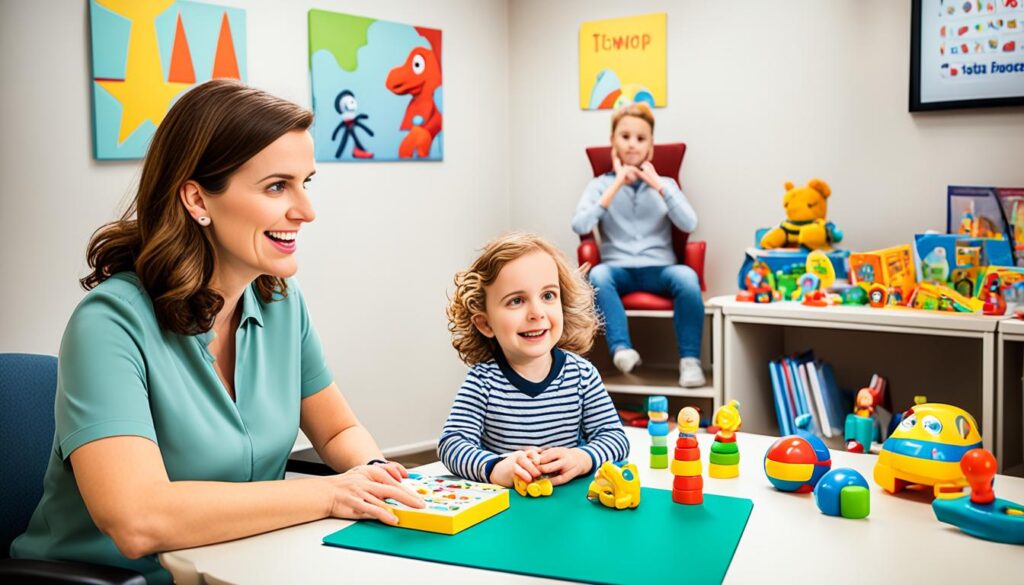For parents and teachers, knowing about child psychology is key to helping kids grow well. It’s the study of how kids think, feel, and interact from birth to being a teenager. It helps us see how they see the world and deal with others.
This article will cover the basics of child psychology. We’ll look at why it matters, its main parts, and how it shapes kids’ lives. We’ll talk about the importance of child development, early help, and how parents and schools play a big part. We’ll also see why mental health and speaking up matters. By understanding child psychology, we can help kids reach their best and stay happy.
Table of Contents
ToggleUnderstanding the Significance of Child Psychology
Child psychology is key for parents, teachers, and anyone caring for kids. It sheds light on how children think, feel, and interact with others. This knowledge helps adults support kids’ growth. By learning about child psychology, we can spot and fix issues early, help kids develop healthily, and make places that boost their mental health.
The Five Key Aspects of Child Psychology
Child psychology’s importance is shown in five main areas:
- Understanding child development and recognizing milestones and challenges;
- Emphasizing the importance of early intervention to address issues during critical periods of development;
- Recognizing the crucial role of parenting and education in shaping a child’s future;
- Prioritizing mental health and emotional well-being;
- Advocating for policies and resources that support children’s needs.
These areas help adults know how to support kids’ growth and well-being. With this knowledge, we can make places that help kids’s minds, feelings, and social skills grow. This prepares them for a bright future.

What is Child Psychology?
Child psychology is a field that looks into how kids grow, think, and act from before birth to their teenage years. It aims to understand the differences in how kids and adults think and behave. This field covers many topics, like how genes affect behavior and how society impacts development.
Defining Child Psychology
Child psychology is all about studying how kids change mentally, emotionally, and socially over time. It looks at how kids see the world, learn, and adjust to their surroundings. By understanding these changes, experts can help kids grow and stay healthy.
The Three Major Contexts in Child Psychology
- Culture – Culture shapes a child’s values, customs, and way of life. It deeply affects their view of the world, actions, and growth.
- Relationships with Peers and Adults – How kids connect with others, like friends and family, greatly shapes their thoughts, learning, and growth.
- Socioeconomic Status – A child’s chance to get resources and opportunities can change their well-being and growth. This includes their thinking, physical health, and social skills.
Knowing these three main areas helps child psychologists support kids and teens fully. Looking into these areas gives deep insights into child psychology.

Understanding Child Development
Understanding how children grow and progress is key to grasping child psychology. By looking into child development, we see the milestones and hurdles kids face from birth to being teenagers. This helps us support and guide them, spot any delays or disorders early, and help them on time.
Knowing about child development helps us greatly in helping kids do well in life. Kids go through many changes in physical, cognitive, social, and emotional areas. These changes shape their growth and who they become.
- Physical Development: This part covers the growth of the body, motor skills, and senses. Seeing a child hit milestones like reaching, crawling, walking, and getting coordinated tells us a lot about their development.
- Cognitive Development: This is about how kids think, learn, and solve problems. Watching their cognitive growth shows us their language skills, memory, and thinking abilities.
- Social and Emotional Development: This looks at how kids connect with others, form relationships, and handle their feelings. It’s key for their social skills and emotional health.
Exploring child development helps us understand the complex path kids take. With this knowledge, we can support and guide them better. This ensures they grow and thrive the best they can.
Early Intervention in Child Psychology
Early intervention is key in child psychology. It lets experts spot and fix issues early in a child’s life. This way, kids can get help for problems like developmental delays or behavior issues.
Early help prevents serious problems later, helps parents, and boosts kids’ growth. It’s a way to catch and fix issues before they get worse. This ensures kids start life on the right foot.
Some key benefits of early intervention in child psychology include:
- Improved developmental outcomes for children
- Increased likelihood of academic and social success
- Reduced need for more intensive interventions later on
- Empowerment of parents and caregivers to support their child’s growth
- Promotion of overall well-being and mental health in children
Understanding early intervention’s value means every child gets the support they need to do well. This approach helps the child, the family, and the community too.

In child psychology, early intervention is vital for healthy growth and future success. By focusing on this, we can change young lives for the better. It leads to a brighter future for everyone.
The Crucial Role of Parenting and Education
Parenting and education are key to a child’s mental health and school success. As parents, we shape our children’s lives with positive discipline. This teaches them important skills like empathy, responsibility, and resilience. Healthy relationships and attachment help them feel emotionally stable and grow well.
Parenting and its Impact
How we parent affects our children’s growth and learning. We create trust, safety, and a sense of belonging through loving interactions. By setting clear rules and being good role models, we help them learn to manage their feelings and solve problems.
Education and Learning Experiences
Education lets kids explore their interests and grow their minds. Teachers can make learning fit each child’s needs, helping them reach their best potential. Working together, parents and teachers create a supportive place for kids to learn and grow.

Good parenting and quality education go hand-in-hand to help kids do well in life. By focusing on these areas, we give our children the tools they need to succeed.
Prioritizing Mental Health in Child Psychology
Mental health is crucial for kids, affecting their growth and development. Early action on mental health issues helps kids develop coping skills. It also boosts their school work, friendships, and future success.
Knowing about a child’s mental health helps spot learning or behavior problems early. This means kids get the help they need to deal with life’s ups and downs. Here are some ways to focus on mental health in child psychology:
- Early Identification and Intervention: Keep an eye on a child’s feelings and actions. This way, you can catch issues early and get help fast.
- Promoting Emotional Literacy: Help kids understand and share their feelings. This helps them cope better and make stronger friendships.
- Fostering Resilience: Teach kids how to solve problems, control their feelings, and recover from tough times. This makes them stronger.
- Collaboration between Professionals: Working together with mental health experts, teachers, and parents ensures a full support plan for a child’s mental health.
- Creating Supportive Environments: Safe, caring, and welcoming places at home and school are key for a child’s mental health.
Putting mental health first in child psychology lets kids do their best in school and life. This caring approach shapes their future in big ways.
Child Psychology: Policy and Advocacy
Advocacy and policy are key in making sure kids get the mental support they need. By pushing for policies that focus on child psychology, we help kids get the right services early. This includes spotting and treating mental health problems.
Advocacy also spreads the word on why child psychology matters. It helps lower the stigma around mental health. This makes it easier for kids to get help without fear.
The Importance of Advocacy and Policy
Policies can also fund research and training. This keeps professionals up-to-date with child psychology. With advocacy and policy, we make a place where kids’ mental health is a top concern.
- Advocacy ensures access to essential services and interventions for children’s mental health
- Advocacy efforts raise awareness and reduce stigma surrounding child psychology
- Policies provide funding for research and training programs to advance the field
- Advocacy and policy create a supportive environment where children’s mental health is prioritized
By using advocacy and policy, we help kids reach their full potential. We aim for a future where mental well-being is a key part of life.
Key Figures and Theories in Child Psychology
Child psychology has seen major changes thanks to many famous thinkers and researchers. Sigmund Freud, Melanie Klein, Anna Freud, and Jean Piaget have changed how we see children’s minds and growth.
Sigmund Freud is known as the father of psychoanalysis. He looked into the hidden parts of the mind and how they affect kids. His ideas on early childhood and psychosexual stages are key to understanding kids.
Melanie Klein and Anna Freud also made big marks in child psychology. Klein studied children’s feelings and the power of imagination. Anna Freud looked into how kids develop their sense of self.
Then there’s Jean Piaget, who changed how we teach kids. His ideas on how kids think and solve problems have made learning better.
G. Stanley Hall and Bruno Bettelheim also left their mark. Hall started the study of child development. Bettelheim focused on kids’ feelings and experiences.
These thinkers and their work have greatly influenced child psychology. They help us support kids in growing and staying well.
Research Methods in Child Psychology
Child psychology is filled with different research methods that help us understand child development and behavior better. Researchers use many techniques to collect data and learn more about children’s lives.
Direct observation is a key method. We watch children in their everyday settings, like at home, school, or in the community. This lets us see how they interact, react, and move through their world. We also use one-way mirrors to observe children without interrupting them.
We also use personality and intelligence tests, and conduct experiments. These help us learn about children’s thinking, feelings, and social skills. They let us track progress, spot challenges, and create support plans for kids.
Child psychology is always changing as new research comes out. We keep exploring child development and what influences it. This helps us understand and help children better, both as individuals and community members.
FAQ
What is child psychology?
Child psychology studies how kids think, feel, and interact from birth to being a teenager. It looks at how they see the world and deal with others.
Why is child psychology crucial?
It’s key for those who work with kids, like parents and teachers. It helps them understand how kids grow and feel.
What are the key aspects of child psychology?
Key parts include understanding child growth, the need for early help, and how parents and schools shape kids. It also focuses on mental health and supporting children’s needs through policies.
What are the three major contexts in child psychology?
Child psychology is shaped by culture, relationships, and economic status. These factors influence a child’s development and well-being.
How does early intervention benefit child psychology?
Early help is vital. It lets experts spot and fix issues early. This way, kids get the help they need to overcome problems like delays or behavior issues.
What is the role of parenting and education in child psychology?
Parents and schools are key. They teach kids important skills and values. Working together, they create a supportive place for kids to grow and learn.
Why is mental health important in child psychology?
Mental health is crucial for kids’ development. Early support helps them build strength and learn to cope with challenges.
How do advocacy and policy impact child psychology?
Advocacy and policy shape support for kids’ mental health. They ensure kids get the help they need, like early mental health care.
Who are some key figures in child psychology?
Important names include Sigmund Freud and Jean Piaget. Their ideas have shaped how we help children grow and stay well.
What research methods are used in child psychology?
Researchers use many ways to study kids, like watching them, testing them, and talking to those who know them well. Child psychology is always changing with new discoveries.
Source Links
- https://www.verywellmind.com/what-is-child-psychology-2795067 – Children’s Psychology: Contexts and Influences
- https://www.britannica.com/science/child-psychology – Child psychology | Parenting, Development & Education
- https://njpediatricneurosurgery.com/posts/news/what-are-the-5-importance-of-child-psychology/ – What are the 5 importance of child psychology? – New Jersey Pediatric Neuroscience Institute
About The Author

Medically reviewed by Dr. Chandril Chugh, MD, DM (Neurology)
Dr. Chandril Chugh is a U.S.-trained, board-certified neurologist with expertise in diagnosing and managing neurological disorders, including migraines, epilepsy, Parkinson’s disease, and movement disorders. His clinical focus includes evidence-based neurological care and patient education.
All content is reviewed for medical accuracy and aligned with current neurological guidelines.




